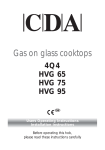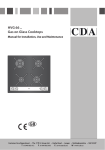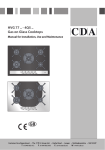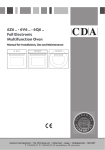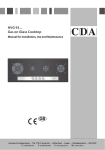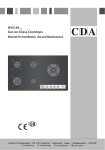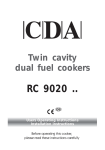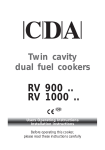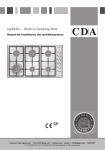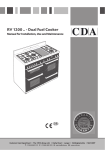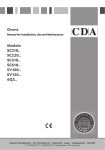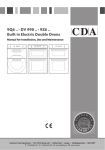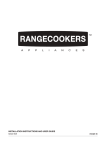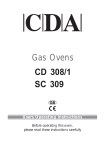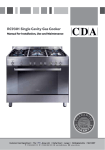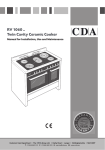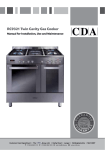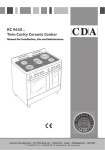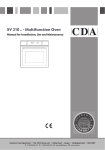Download CDA COOKING HOB HCG 730 User's Manual
Transcript
Built-in cooking hob HCG 730 HCG 740 GB Users Operating Instructions Installation instructions Before operating this hob, please read these instructions carefully Dear Customer, Thank you for choosing one of our products. The warnings and tips given below are intended to protect your safety and that of others. They will also help you make the most of your appliance. Keep this booklet in a safe place. It will be useful if you, or anyone else, have any questions about use of the appliance. This appliance must only be used for the purpose for which it was designed, i.e. for cooking foods. Any other use should be considered incorrect and therefore dangerous. The manufacturer is not responsible for damage caused by improper, incorrect or irresponsible use of the appliance. 2 Declaration of CE conformity ✓ This hob (Class 3) has been designed for use only as a cooking appliance. Any other use (e.g. heating rooms) should be considered incorrect and therefore dangerous. ✓ This hob has been designed, constructed and put on to the market in conformity with: - Safety requirements of EU Directive "Gas" 90/396/EEC; - Safety requirements of EU Directive "Low Voltage" 2006/95/EC; - Protection requirements of EU Directive "EMC" 89/336/EEC; - Requirements of EU Directive 93/68/EEC. GB These instructions are only valid for those countries whose identification symbol appears on the cover of the instruction booklet and on the appliance. Important: This appliance is designed and manufactured solely for the cooking of domestic (household) food and is not suitable for any non domestic application and therefore should not be used in a commercial environment. The appliance guarantee will be void if the appliance is used within a non domestic environment i.e. a semi commercial, commercial or communal environment. 3 BEFORE USING FOR THE FIRST TIME • Read the instructions carefully before installing and using the appliance • After unpacking the appliance, make sure it is not damaged. In case of doubt, do not use the appliance and contact your supplier or a qualified engineer. • Remove all packaging and do not leave the packing material (plastic bags, polystyrene, bands etc ) in easy reach of children as they may cause serious injury. The packaging materials are recyclable. • The appliance should be installed and all the gas/electrical connections made by a qualified engineer in compliance with local regulations in force and following the manufacturer’s instructions. • Do not attempt to modify the technical properties of the appliance, as it may become dangerous to use. CAUTION: If the burner is accidentally extinguished, turn the gas off at the control knob and wait at least 1 minute before attempting to relight. CAUTION: Gas hobs produce heat and humidity in the environment in which they are installed. Ensure that the cooking area is well ventilated by opening the natural ventilation grilles or by installing an extractor hood connected to an outlet duct. CAUTION: If the hob is used for a prolonged time it may be necessary to provide further ventilation by opening a window or by increasing the suction power of the extractor hood (if fitted). 4 IMPORTANT SAFEGUARDS & RECOMMENDATIONS • Do not carry out any cleaning or maintenance without first disconnecting the appliance from the electrical supply. • During and after use of the hob, certain parts will become very hot. Do not touch hot parts. • After use always ensure that the control knobs are in the “●” OFF position. • Young children should be supervised to ensure that they do not play with the appliance. • Keep children away from the hob during use. • The appliance is not intended for use by young children or infirm persons unless they have been adequately supervised by a responsible person to ensure that they can use the appliance safely. • Do not allow young children or infirm persons to use the appliance without your supervision. • WARNING When correctly installed, your product meets all safety requirements laid down for this type of product category. However special care should be taken around the underneath of the appliance as this area is not designed or intended to be touched and may contain sharp or rough edges, that may cause injury. • Fire Risk! Do not leave inflammable materials on the hob top. • Make sure that electrical cords connecting other appliances in the proximity cannot come in to contact with the hob top. • Never use a damaged appliance. Get it checked or repaired: “see appliance servicing”. • When the appliance is not being used, it is advisable to keep the gas tap closed. • Regular lubrication of the gas taps must only be carried out by qualified engineers. Contact Service in case of problems with the operation of the gas taps. • Before disposing of an unwanted appliance, it is recommended that it is made inoperative and that all potentially hazardous parts are made harmless. • If the supply cord is damaged, it must be replaced by a special cord by a qualified electrical technician in order to avoid a hazard. 5 Features Models: HCG 730 Models: HCG 740 5 6 7 8 9 Figure 1 5 6 7 8 9 Figure 2 This appliance is class 3 COOKING POINTS 1. Auxiliary burner (A) 2. Semirapid burner (SR) 3. Rapid burner (R) 4. Triple-ring burner (TR) - 1,00 kW - 1,75 kW - 3,00 kW - 3,50 kW CONTROL PANEL DESCRIPTION 5. Auxiliary burner control knob (1) 6. Rear left semirapid burner control knob (2) 7. Triple ring burner control knob (4) 8. Rapid burner control knob (3) 9. Front right semirapid burner control knob (2) NOTE: ✓ The appliance may be provided with: • a gas-lighter incorporated in the knobs ( symbol beside big flame maximum aperture or max gas flow) • no gas-lighter (no symbol beside the knob) • safety valve system. - ✓ If the appliance has a safety valve system fitted (beside every burner is a T-shaped probe, as in Fig. 7 - not to be confused with the S-shaped electrode of the gas lighter), the flow of gas will be stopped if and when the flame should accidentally go out. 6 Use of the Hob GAS BURNERS Gas flow to the burners is adjusted by turning the knob illustrated in figs. 3a - 3b which control the valves. Turning the knob so that the indicator line points to the symbols printed on the panel achieves the following functions: ✓ full circle ● ✓ symbol – ✓ symbol = closed valve = maximum aperture or flow = minimum aperture or flow The maximum aperture position permits rapid boiling of liquids, whereas the minimum aperture position allows slower warming of food or maintaining boiling conditions of liquids. To reduce the gas flow to minimum, rotate the knob further anti-clockwise to point the indicator towards the small flame symbol. Other intermediate operating adjustments can be achieved by positioning the indicator between the maximum and minimum aperture positions, not between the maximum aperture and closed positions. N.B. When the hob is not being used, set the gas knobs to their closed positions and also close the cock valve on the gas bottle or the main gas supply line. Figure 3a Models with electric ignition only Models with safety cut-off valves Figure 3b Models with electric ignition only Models without safety cut-off valves 7 LIGHTING THE BURNERS Models without safety cut-off valves In order to light the burner, you must: Models without electric ignition: 1 – To light one of the gas burners, hold a flame (e.g. a match) close to the top part of the burner, push in and turn the relative knob (fig. 3b) in an anticlockwise direction (fig. 4), pointing the knob indicator towards the large flame symbol (i.e. max. gas flow). 2 – Adjust the burner according to the power required. 3 – To turn it off, turn the knob towards the right, up to the safety click. Models with electric ignition incorporated into the knobs: 1 – Lightly press the knob fig. 3b in anti-clockwise direction (fig. 4) up to the maximum aperture (symbol ), push in and hold the knob; this will light the gas. In the case of a mains failure light the burner with a match or lighted taper. 2 – Adjust the burner according to the power required. 3 – To turn it off, turn the knob towards the right, up to the safety click. Figure 4 N.B. If your local gas supply makes it difficult to light the burner with the knob set to maximum, set the knob to minimum and repeat the operation. 8 LIGHTING THE BURNERS Models fitted with safety cut-off valves In order to light the burner, you must: Models without electric ignition: 1 – To light one of the gas burners, hold a flame (e.g. a match) close to the top part of the burner, push in and turn the relative knob (fig. 3a) in an anticlockwise direction (fig. 4), pointing the knob indicator towards the large flame symbol (i.e. max. gas flow). 2 – Wait about ten seconds after the gas lighting before releasing the knob (starting time for the valve). 3 – Adjust the gas valve to the desired power. Models fitted with electric ignition incorporated into the knobs: 1 – Press in the corresponding knob and turn counter-clockwise (fig. 4) to the full flame position marked by the symbol (fig. 3a) and hold the knob in until the flame has been lit. In the case of a mains failure light the burner with a match or lighted taper. 2 – Wait about ten seconds after the gas lighting before releasing the knob (starting time for the valve). 3 – Adjust the gas valve to the desired power. MODELS FITTED WITH SAFETY CUT-OFF VALVES Important If the burner flame should go out for some reason, the safety valve will automatically stop the gas flow. To re-light the burner, return the knob to the closed ● position, wait for at least 1 minute and then repeat the lighting procedure. If your local gas supply makes it difficult to light the burner with the knob set to maximum, set the knob to minimum and repeat the operation. 9 CHOICE OF BURNER The symbols printed on the panel by the side of the knob indicate which burner you are controlling. Choose a suitable burner depending on the cookware diameter and capacity. The pan diameter should be suitable for the burner power to make the most of the burner's high efficiency and not waste fuel. A small pan does not boil more quickly on a large burner (fig. 5). Attention: During use the hob becomes very hot under the cooking zones. Keep children away. Figure 5 PAN DIAMETER BURNER MINIMUM MAXIMUM Auxiliary 12 cm 14 cm Semirapd 16 cm 24 cm(1) Rapid 24 cm 26 cm Triple-ring 26 cm Woks (2) 28 cm max 36 cm do not use pans with concave or convex bases (1) front right burner, maximum diameter 22 cm. (2) Models with triple-ring burner and with wok pan adapter supplied: wok pans have to be used only with the special grille fitted (see correct use of triple-ring burner). 10 CORRECT USE OF TRIPLE-RING BURNER ✓ The flat-bottomed pans are to be placed directly onto the pan-support. ✓ To use the WOK you need to place the proper stand (supplied with some models only) in order to avoid any faulty operation of the triple-ring burner (Fig. 6a). IMPORTANT: The special grille for wok pans (supplied with some models only) (fig. 6b) MUST BE PLACED ONLY over the pan-rest for the triple-ring burner. Figure 6a Figure 6b WRONG CORRECT 11 Cleaning and Maintenance GENERAL TIPS ✓ ✓ ✓ ✓ ✓ Before cleaning the hob switch it off and wait for it to cool down. Clean with a cloth, hot water and soap or liquid detergent. Do not use products which are abrasive, corrosive or chlorine based. Do not use steel pads. Do not leave acid or alkaline substances (vinegar, salt, lemon juice, etc.) on the hob. ✓ Do not use steam jet cleaners because the humidity could infiltrate into the appliance making it dangerous. ✓ WARNING: When correctly installed, your product meets all safety requirements laid down for this type of product category. However special care should be taken around the underneath of the appliance as this area is not designed or intended to be touched and may contain sharp or rough edges, that may cause injury. ENAMELLED PARTS ✓ All the enamelled parts must be washed only with a sponge with soapy water or other non-abrasive products. ✓ Dry preferably with a soft cloth. ✓ If acid substances such as lemon juice, tomato conserve, vinegar etc. are left on the enamel for a long time they will etch it, making it opaque. STAINLESS STEEL SURFACES ✓ Stainless steel parts should be rinsed with water and dried with a microfibre or soft cloth. ✓ For persistent dirt, use specific non-abrasive products available commercially or a little hot vinegar. ✓ Note: regular use will cause discolouring around the burners, because of the high flame temperature. 12 BURNERS AND GRIDS ✓ These parts can be removed and cleaned with appropriate products. ✓ After cleaning, the burners and their flame spreaders must be well dried and correct- ly replaced. ✓ It is very important to check that the burner flame spreader and the cap have been correctly positioned. Failure to do so can cause serious problems. ✓ In appliances with electric ignition, check that the electrode “S” (fig. 7) is always clean to ensure trouble-free sparking. ✓ In the models with safety device, check that the probe “T” (fig. 7) next to each burn- er is always clean to ensure correct operation of the safety valves. ✓ Both the probe and ignition plug must be very carefully cleaned. ✓ Note: To avoid damage to the electric ignition do not use it when the burners are not in place. GAS TAPS ✓ Regular lubrication of the gas taps must only be performed by specialised engineers. ✓ If the gas taps are not working properly call the After-Sales Service. CONTROL KNOBS ✓ The control knobs may be removed for cleaning but care should be taken not to damage the seal. 13 CORRECT POSITIONING OF THE BURNERS ✓ It is very important to check that the burner flame spreader “F” and the cap “C” have been correctly positioned (see figs. 7 and 8). Failure to do so can cause serious problems. Figure 7 C F Electrode "S" models with electric ignition only 14 Probe "T" models with safety cut-off valves only Figure 8 CORRECT POSITION OF TRIPLE RING BURNER The triple ring burner must be correctly positioned (see fig. 9); the burner ribs must be fitted in their housing as shown by the arrow. The burner correctly positioned must not rotate (fig. 10). Then position the cap A and the ring B (figs. 10 - 11). Figure 9 Figure 11 Figure 10 A B 15 Tips for installation Location ✓ The appliance may be installed in a kitchen, Kitchen/diner or a bed sitting room, but not in a room or space containing a bath or a shower. ✓ The appliance must not be installed in a bed-sitting room of less than 20 m3. ✓ The appliance is designed and approved for domestic use only and should not be installed in a commercial, semi commercial or communal environment. ✓ Your product will not be guaranteed if installed in any of the above environments and could affect any third party or public liability insurances you may have. ✓ This hob should only be installed by a qualified installer. Failure to observe this rule leads to cancellation of the guarantee. ✓ The appliance must be installed correctly, in compliance with the regulations in force and following the manufacturer's instructions. ✓ Any repair or maintenance must be performed with the appliance switched off. ✓ These appliances have been designed and manufactured to be fitted into heat-resis- tant units. ✓ These hobs are designed to be fitted into 600 mm deep kitchen units. ✓ The unit walls must not be higher than the working surface and must withstand a temperature of 75°C more than room temperature. ✓ Avoid installation near inflammable materials (e.g. curtains). 16 Figure 12 TECHNICAL INFORMATION FOR THE INSTALLER 450 mm ✓ within the unit, between the bottom 650 mm In order to install the cooktop into the kitchen fixture, a hole with the dimensions shown in fig. 13 has to be made, bearing in mind the following: of the cooktop and the upper surface of a shelf there must be a clearance of at least 30 mm. It is absolutely essential that you place a separator between the base of the cooktop and the built-in unit or the oven; ✓ the cooktop must be kept no less than 200 mm away from any side wall (fig. 13). ✓ the hob must be installed at least 60 mm from the wall. Figure 13 ✓ there must be a dis- 680 500 60 200 560 ✓ if the hob is installed over a built-in @;;@ ;@ It is recommended that a 30 mm clearance be left between the cooktop and the fixture surface (fig. 14). ;;;;;;;; ;; 30 mm INSTALLATION IN KITCHEN CABINET WITH DOOR (fig. 14) Figure 14 ;;;;;;; oven, there must be a distance of at least 30 mm between the two appliances. The two appliances should be connected to the gas supply with independent connections. 0 48 0 –2 0 –2 ;;;;; tance of at least 650 mm between the hob and any wall cupboard or extractor hood positioned immediately above (see fig. 12). Clearance Door Space for connections 17 APPLYING THE SEALS ✓ Turn the cooktop upside down. ✓ Spread the longer seal “A” around the left, rear and right sides as shown in figure 15a. ✓ With a cutter or a scissors cut the excess seal “C” and retain it for next use (figure 15b). ✓ Spread the seal “B” around the left, front and right edges of the cooktop as shown in figure 15c. ✓ Spread the seal “C” along the rear edge of the cooktop as shown in figure 15d. Making sure that the beginning and the end overlap at the seal “B” (see figure 15e). Figures 15 fig. 15a fig. 15b fig. 15c seal C seal A seal C fig. 15d seal B seal C side Rear seal B seal A 18 fig. 15e e t sid Fron FASTENING THE INSTALLATION BRACKETS FASTENING THE COOKTOP ✓ Insert the cooktop into the hole and position it correctly. Each cooktop is provided with an installation kit including brackets and screws for fastening the top to fixture panels from 2 to 4 cm thick. ✓ Adjust the position of the brackets “F ✓ Turn the cooktop upside down and ✓ With a sharp cutter or trimmer knife fasten the brackets “F and R” to the appropriate socket holes, without tightening the screws “B” for the moment. trim the excess sealing material around the edge of the cooktop. Take care not to damage the workbench. and R” and tighten screws “B” to block the cooktop firmly in position. ✓ Make sure that the brackets are fas- tened as shown in figures 16a, 16b and 16c. Figures 16 R R fig. 16a F NT FRO F Rear side Front side seal C fig. 16b B B F fig. 16c 40 mm max. 40 mm max. 20 mm min. R 20 mm min. seal A seal A 19 Ventilation requirements ✓ The appliance should be installed into a room or space with an air supply in accor- dance with BS 5440-2: 2000. ✓ For rooms with a volume of less than 5 m3 - permanent ventilation of 100 cm2 free area will be required. ✓ For rooms with a volume of between 5 m3 and 10 m3 a permanent ventilation of 50 cm2 free area will be required unless the room has a door which opens directly to the outside air in which case no permanent ventilation is required. ✓ For rooms with a volume greater than 10 m3 - no permanent ventilation is required. NB. Regardless of room size, all rooms containing the appliance must have direct access to the outside air via an openable window or equivalent. ✓ Where there are other fuel burning appliances in the same room, BS 5440-2: 2000 should be consulted to determine the correct amount of free area ventilation requirements. ✓ The above requirements allow also for use of a gas oven and grill but if there are other gas burning appliances in the same room, consult a qualified engineer. 20 Gas supply requirements IMPORTANT NOTE This appliance is supplied for use on NATURAL GAS or LPG (check the gas regulation label attached on the appliance). ✓ Appliances supplied for use on NATURAL GAS: they are adjusted for this gas only and cannot be used on any other gas (LPG) without modification. The appliances are manufactured for conversion to LPG. ✓ Appliances supplied for use on LPG: they are adjusted for this gas only and cannot be used on any other gas (NATURAL GAS) without modification. The appliances are manufactured for conversion to NATURAL GAS. If the NATURAL GAS/LPG conversion kit is not supplied with the appliance this kit can be purchased by contacting the After-Sales Service. INSTALLATION & SERVICE REGULATIONS (UNITED KINGDOM) It is a legal requirement that all gas appliances are Installed & Serviced by a competent person in accordance with the current editions of the following Standards & Regulations or those regulations appropriate to the geographical region in which they are to be installed: ✓ Gas Safety (Installation & Use) Regulations ✓ Building Regulations ✓ British Standards ✓ Regulations for Electrical Installation Installation and service of any gas product must be made by a suitably qualified person competent on the type of product being installed or serviced and holding a valid certificate of competence for the work being carried out. Currently the proof of competence is the Accredited Certification Scheme (ACS) or S/NVQ that has been aligned to the ACS. It is also a requirement that all businesses or self employed installers are members of a class of person approved by the Health and Safety Executive. Currently the only body with such approval is CORGI. Failure to install the appliance correctly could invalidate any manufacturers warranty and lead to prosecution under the above quoted regulation. 21 Gas Connection The installation of the gas appliance to Natural Gas or LP Gas must be carried out by a C.O.R.G.I. registered installer. Installers shall take due account of the provisions of the relevant British Standards Code of Practice, the Gas Safety Regulations and the Building Standards (Scotland)(Consolidation) Regulations issued by the Scottish Development Department. INSTALLATION TO NATURAL GAS Installation to Natural Gas must conform to the Code of Practice, etc. The supply pressure for Natural Gas is 20 mbar. The installation must conform to the relevant British Standards. INSTALLATION TO LP GAS When operating on Butane gas a supply pressure of 28-30 mbar is required. When using Propane gas a supply pressure of 37 mbar is required. The installation must conform to the relevant British Standards. CDA are not legally able to provide any assistance in the installation of gas appliances except to Corgi registered installers. Any Corgi registered fitter requiring help must provide name, address and registration number. Information supplied will be validated before help is provided. Warning: Only a C.O.R.G.I. registered installer, also with technical knowledge of electricity should install the appliance. He should observe the Regulations and Codes of Practice governing such installation of gas appliances. Note: It is recommended that the gas connection to the appliance is installed with a flexible connecting tube made to BS5386. Notes: ✓ Flexible hoses can be used where the sited ambient temperature of the hose does not exceed 70°C. These hoses must be manufactured in accordance with BS669 part 1 and be of the correct construction for the type of gas being used. ✓ Gas hoses designed for natural gas MUST NOT be used for supplying LPG gas (LPG gas hoses can be identified by a either a red band or stripe on the rubber outer coating of the hose). The hose should not be crushed or trapped or be in contact with sharp or abrasive edges. 22 GAS CONNECTOR GB Cat: II 2H3+ The fitting (fig. 17) is made up of: ✓ 1 nut “A” ✓ 1 elbow fitting “C” ✓ gasket “F” CONNECTION TO THE GAS SUPPLY ✓ Be careful when flexible pipes are used that they do not come into contact with moving parts. ✓ To maintain the thickness of 3 cm, the hob is fitted with a channel to contain the connection pipe. ✓ The gas inlet union can be turned in the direction required after the elbow fitting “C” and nut “A” connection (figure 17) has been slackened (Fig. 18). ✓ Never put it in the horizontal or vertical position. ✓ Never attempt to turn the elbow “C” without having first slackened off the relative lock nut “A”. ✓ The gasket “F” (fig. 17) guarantees the seal of the gas connection. It is recommended that it be replaced whenever it shows even the slightest deformation or imperfection. ✓ Using a suitable leak detection fluid solution (e.g. Rocol) check each gas connection one at a time by brushing the solution over the connection. The presence of bubbles will indicate a leak. If there is a leak, tighten the fitting and then recheck for leaks. IMPORTANT! Do not use a naked flame to test for leaks Figure 17 1/2" G cylindrical (ISO 228-1) male C Figure 18 1/2" G cylindrical (ISO 228-1) female F A 1/2" G conical (ISO 7-1) male 23 If installation is to be carried out using a flexible connector (to BS669), then the following points must be adhered to: Note: The gas installation pipes and the final connection to the appliance connecting pipe shall be sufficient size to maintain the heat output of the appliance as specified under installation. 1. The appliance flexible connector should not be subject to undue forces, either in normal use whilst being connected or disconnected. 2. The appliance flexible connector should not be subject to excessive heat by direct exposure to flue products or by contact with hot surfaces. 3. The socket into which the plug of the appliance flexible connector fits should be permanently attached to a firmly fixed gas installation pipe and positioned such that the hose hangs freely downwards. 4. The appliance flexible connector should be positioned such that it will not suffer mechanical damage; eg abrasion from the surrounding kitchen furniture which may be moved in use, such as a door or drawer, or by being trapped by a stability device. 5. The plug-in connector should be accessible for disconnection after moving the appliance. 24 Conversion to Natural Gas or LPG REPLACING THE BURNER INJECTORS If the NATURAL GAS/LPG conversion kit is not supplied with the appliance this kit can be purchased by contacting the After-Sales Service. Choose the injectors to be replaced according to the table on next page. The injector diameter, expressed in hundredths of a millimetre, is marked on the injector body. To replace the injectors proceed as follows: ✓ Remove the gratings, the burner covers and the knobs; ✓ Using a wrench, substitute the nozzle injectors “J” (Figs. 19 - 20) with those most suitable for the kind of gas for which it is to be used. The burners are made in such a way so as not to require regulation of the primary air. Figure 20 Figure 19 J J 25 Table for the choice of the Injectors GB Cat: II 2H3+ G30/G31 28-30/37 mbar G 20 20 mbar [Hs - kW] [Hs - kW] Ø injecteur Ø injecteur [1/100 mm] [1/100 mm] Auxiliary (A) 1,00 0,30 0,50 0,72 (X) Semirapid (SR) 1,75 0,45 0,65 0,97 (Z) BURNER 26 NOMINAL REDUCED POWER POWER (HS - kW) (HS - kW) Rapid (R) 3,00 0,75 0,85 1,15 (Y) Triple ring (TR) 3,30 1,50 0,95 1,35 (T) ADJUSTING THE GAS BURNER MINIMUM For taps with adjusting screw inside the shaft (fig. 21): ✓ using a screwdriver max. diameter 3 mm turn the screw inside the tap shaft until the flame setting is correct. For taps with adjusting screw on the body (fig. 22): ✓ using a screwdriver turn screw "A" until the flame setting is correct. ✓ In some models with a gas-lighter incorporated into the knob, turn screw “A” via the hole in the microswitch. Normally for LPG, fully tighten the adjustment screw. LUBRICATING THE GAS TAP If a gas tap is difficult to turn, disassemble it, clean it carefully with petrol and spread a little high-temperature-resistant grease on it. These operations must be performed by a specialised engineer. Figure 21 Figure 22 A 27 Electrical Connection IMPORTANT: The appliance must be installed by a qualified technician according with the current local regulations and in compliance with the manufacturer instructions. Incorrect installation may be dangerous and the manufacturer can not be held responsible. Warning! This appliance must be earthed A properly earthed three pin plug (fused at 3 amps, to BS 1362 ASTA approved) must be used. As the colours of the wires in the mains lead of this appliance may not correspond with the coloured markings identifying the terminals in your plug, proceed as follows. The wire which is coloured GREEN & YELLOW must be connected to the terminal in the plug which is marked with letter "E" or by the Earth symbol or coloured GREEN & YELLOW. The wire which is coloured BLUE must be connected to the terminal which is marked with the letter "N" or coloured BLACK. The wire which is coloured BROWN must be connected to the terminal which is marked with the letter "L" or coloured RED. Figure 23 Green & Yellow Earth Blue Neutral 28 3 amp fuse Brown Live SECTION OF THE SUPPLY CABLES - TYPE “H05V2V2-F” resistant to temperatures of 90°C 230 VAC 50 Hz 3 x 0,75 mm2 ✓ The electrical cable must be connected to the terminal board following the diagram of Fig. 24. The appliance must be earthed. The manufacturer declines all responsibility for any problem caused by failure to observe this rule. Figure 24 230 V L1 PE N(L2) 29 Appliance servicing CDA provide a quality and effective after-sales service to cover all your servicing needs. Please attach your receipt to this page for safekeeping. Please help us to help you by having the following information available when booking a service-call: 1. Model type, make and model – see the product data plate. 2. Evidence of installation / purchase date 3. Retailer where appliance was purchased 4. Clear and concise details of the fault 5. Full address including postcode and any contact phone numbers Contact telephone numbers CDA Customer Care Department • Telephone: 01949 862012 • Fax: 01949 862003 • Email: [email protected] 30 Guarantee CDA appliances carry a five-year parts and a one-year labour guarantee. CDA will repair or replace any defect or part attributable to faulty material or workmanship. Within the first year this will be free of both labour and parts charges. After the first year and within five years, the parts will be supplied free of charge provided that the repair is carried out by an agent authorised by CDA and the labour will be charged at the commercial rate applicable at the time of repair. The appliance must have been installed by a suitably qualified person and in accordance with the manufacturer’s instructions and current legislation. The guarantee does not cover faults caused by the incorrect fitting of appliances. Limit of Cover • The guarantee does not cover cosmetic damage e.g. discolouration or oxidisation. • Proof of purchase or installation date must be produced before a service-call will be booked. • The appliance must be used for domestic purposes only. Appliances used for commercial or professional purposes are not covered by the guarantee. Commercial warranty is available at extra cost. • The appliance must not be modified or tampered with or repair attempted by any unauthorised person. • The guarantee does not cover damage caused in transit or by misuse, accident, abuse or neglect. • The guarantee does not cover routine maintenance. • Use of parts not supplied or recommended by |C|D|A| will invalidate the warranty. • Rubber seals, filters, removable glass parts, control knobs and buttons, fuses and light bulbs will need replacing periodically and are not covered by the guarantee. • Second-hand or reconditioned appliances are not covered by the guarantee. The conditions under which this guarantee is offered are in addition to the statutory rights of the domestic purchaser and these statutory rights are not affected by this guarantee. CDA reserve the right to change specification without prior notice. 31 Cod. 1103114 ß2 P70 Series Gas Cooktop The Group Ltd Harby Road Langar Nottingham NG13 9HY UK VAT No : 528 7168 19 Registered in England : 2621460 ● ● ● ● ●
































